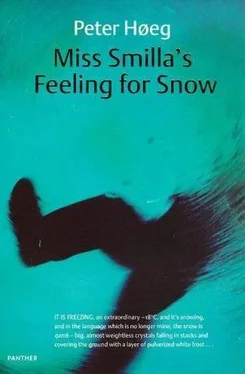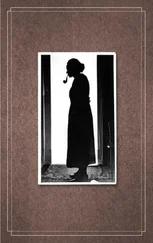Peter Høeg - Smilla's Sense of Snow aka Miss Smilla's Feeling for Snow
Здесь есть возможность читать онлайн «Peter Høeg - Smilla's Sense of Snow aka Miss Smilla's Feeling for Snow» весь текст электронной книги совершенно бесплатно (целиком полную версию без сокращений). В некоторых случаях можно слушать аудио, скачать через торрент в формате fb2 и присутствует краткое содержание. Жанр: Современная проза, на английском языке. Описание произведения, (предисловие) а так же отзывы посетителей доступны на портале библиотеки ЛибКат.
- Название:Smilla's Sense of Snow aka Miss Smilla's Feeling for Snow
- Автор:
- Жанр:
- Год:неизвестен
- ISBN:нет данных
- Рейтинг книги:3 / 5. Голосов: 1
-
Избранное:Добавить в избранное
- Отзывы:
-
Ваша оценка:
- 60
- 1
- 2
- 3
- 4
- 5
Smilla's Sense of Snow aka Miss Smilla's Feeling for Snow: краткое содержание, описание и аннотация
Предлагаем к чтению аннотацию, описание, краткое содержание или предисловие (зависит от того, что написал сам автор книги «Smilla's Sense of Snow aka Miss Smilla's Feeling for Snow»). Если вы не нашли необходимую информацию о книге — напишите в комментариях, мы постараемся отыскать её.
Smilla's Sense of Snow aka Miss Smilla's Feeling for Snow — читать онлайн бесплатно полную книгу (весь текст) целиком
Ниже представлен текст книги, разбитый по страницам. Система сохранения места последней прочитанной страницы, позволяет с удобством читать онлайн бесплатно книгу «Smilla's Sense of Snow aka Miss Smilla's Feeling for Snow», без необходимости каждый раз заново искать на чём Вы остановились. Поставьте закладку, и сможете в любой момент перейти на страницу, на которой закончили чтение.
Интервал:
Закладка:
He signed an album cover and handed it to Moritz. "I know what you're thinking," he said. "You're thinking now that old idiot has recorded another album."
It was Gurrelieder. I still have the record. It's still an unforgettable recording. I've sometimes thought that the body, our very physical existence, puts a limit on how much pain a mind can bear. And that Victor Halkenhvad, on that record, reaches that limit. So that afterward the rest of us can listen and make that journey without going there ourselves.
Even if, like me, you know nothing about European cultural history, you can still hear a world collapsing in that music, on that record. The question is whether anything has taken its place. Victor didn't think so.
I've looked it up in my journal. That's all I have left my memory. It's ten years ago that you last visited me. Let me tell you that I have Alzheimer's. Even a money doctor like you must know what that means. Every new day a piece of my brain peels away. Soon, thank God, I won't even be able to remember all of you who betrayed me and yourselves.
It was his indifference that did it. At the same time as he sang, trembling, ready to burst, unbearably full of romanticism and its feelings, there was a sense of distance, a place inside him that didn't give a damn.
Jonathan Hviid and I went to the Conservatory together. We started in 1933. The year that Schonberg converted to Judaism. The same year as the Reichstag fire. Jonathan was just like that. The most awful timing. He composed a piece for eight flutes and called it "Silver Polyps." In the midst of the flatulent postwar Danish narrow-mindedness which even regarded Carl Nielsen as too controversial. He wrote a brilliant concerto for piano and orchestra. The piano was supposed to have old-fashioned iron hot plates placed on top of the strings because they produced a very special sound. He never got it performed. Never, not once. He married a woman about whom even I have a difficult time finding anything negative to say. She was in her early twenties when they had the boy. They lived in Bronshøj, in a neighborhood that doesn't exist anymore. Garden sheds with tin roofs. I visited them there. Jonathan wasn't making a dime. The boy was totally neglected. Holes in his clothes, red-eyed, never had a bicycle, was beaten at the local proletarian school because he was too weak from hunger to defend himself. Because Jonathan was supposed to be a great artist. You've all betrayed your children. And it takes an old queen like me to tell you.
The mechanic has pulled over in order to listen.
"The sheds in Bronshøj," he says. "I remember them. They were behind the movie theater."
He broke off ties with me. At some point I heard that they had gone to Greenland. She had taken a job as a teacher. Provided for the family while Jonathan composed for the polar bears. After they came back I visited them only once. The son was there, too. Handsome as a god. Some sort of scientist. Cold. We talked about music. He asked about money the whole time. Permanently scarred. Like you are, Moritz. You haven't visited me for ten years. I hope your fortune suffocates you. There was a certain stubbornness about the boy, too. Like Schonberg. Twelve-tone music. Pure stubbornness. But Schonberg wasn't cold. The boy was ice. I'm tired. I've started peeing in my bed. Can you stand to hear that, Moritz? It'll happen to you someday, too.
He hadn't signed it.
The clipping in the other envelope is a single paragraph:
"On October 7, 1991, the police in Singapore arrested Tørk Hviid, a Danish citizen. The Consulate, on behalf of the Foreign Ministry, has lodged a protest."
It doesn't mean anything to me. But it reminds me that Loyen was once in Singapore, too. To photograph mummies.
We drive out to the North Harbor. Outside the Cryolite Corporation of Denmark he slows down, and we look at each other.
We leave the car near the Svanemolle power plant and stroll toward the harbor, along Sundkrogs Street.
There is a dry wind with barely visible, blowing ice crystals that sting your face.
Now and then we hold hands. Now and then we stop to kiss with cold lips and warm mouths, now and then we walk on separately. We're wearing boots. Snowdrifts have piled up on the sidewalk. And yet we feel like two dancers, gliding in and out of an embrace, a swoop into a lift. He doesn't hold me back. He doesn't weigh me down to the ground, he doesn't urge me forward. One moment he's at my side, the next he's a little behind me.
There's something honest about an industrial harbor. There are no royal yacht clubs here, no promenades, no energy wasted on façades. There are silos for raw materials, warehouses, container cranes.
Inside an open doorway there is a steel hull. We go up a wooden ladder and reach the deck. We sit on the bridge and look out across the white deck. I lay my head on his shoulder. We're sailing. It's summer. We're sailing north. Maybe north along the coast of Norway. Not very far from shore, because I'm afraid of the open sea. Past the mouths of the great fjords. The sun is shining. The sea is blue and clear and deep; as if we had a huge mass of fluid crystal beneath the keel. There's a midnight sun, a reddish, almost leaping disk of light. A faint song of the wind in the guy wires.
We walk out to the marina. Men in smocks ride past on bicycles, turning around to stare at us, and we laugh at them, knowing that we are radiant.
We wander along the quiet docks until we're frozen stiff. We eat in a little cafe that's built onto a smokehouse. Outside, the clouds bow for a brief moment to an extraordinary red sunset that makes the colors on the hulls of the fishing vessels shift from blue-white to rose to purple.
He tells me about his parents. About his father, who never says anything, who is a carpenter and one of the last people in Denmark who knows how to make a winding staircase that twists up toward the sky in a perfect wooden spiral. About his mother, who test bakes cakes for the food pages of women's magazines, cakes that she can't even taste because she's diabetic.
When I ask him how he came to know Birgo Lander, he shakes his head and falls silent. Across the table I caress the side of his jaw, marveling at the way life can suddenly allow us to experience happiness and ecstasy with someone who is a complete stranger.
Outside, night has fallen.
Even in the dark, even in the winter, the wealthy suburb of Hellerup belongs to another dimension than Copenhagen. We've parked the car on a quiet, hushed road. The snow gleams white along the curb and along the high walls surrounding the villas. In the gardens evergreen trees and shrubs form dense black surfaces, like the edge of a forest or the side of a mountain, above a white carpet of snow.
There are no streetlights. And yet we can see the house. A tall white villa standing where the road on which we've parked dwindles down to a lane.
There is no hedge or fence around the house. From the sidewalk you can step directly onto the lawn. Upstairs, on the third floor, there's a light in a window. Everything seems well kept, newly painted, expensive, and discreet.
A few steps from the sidewalk there's a sign on the lawn lit by a lamp. The sign says GEOINFORM.
We were just going to drive by to look at the building. We've been here for an hour now.
It has nothing to do with the house. We could have parked anywhere. And for any length of time.
A police car stops alongside us. It has passed us twice before. Now they've gotten curious.
The officer addresses the mechanic across me. "What's going on here, buddy?"
I stick my head out the window toward the patrol car. "We live in a one-room apartment, Mr. Commissioner. A basement apartment on Jøgersborg Street. We have three children and a dog. Sometimes we just need a little private life. And it can't cost anything. So we drive out here."
Читать дальшеИнтервал:
Закладка:
Похожие книги на «Smilla's Sense of Snow aka Miss Smilla's Feeling for Snow»
Представляем Вашему вниманию похожие книги на «Smilla's Sense of Snow aka Miss Smilla's Feeling for Snow» списком для выбора. Мы отобрали схожую по названию и смыслу литературу в надежде предоставить читателям больше вариантов отыскать новые, интересные, ещё непрочитанные произведения.
Обсуждение, отзывы о книге «Smilla's Sense of Snow aka Miss Smilla's Feeling for Snow» и просто собственные мнения читателей. Оставьте ваши комментарии, напишите, что Вы думаете о произведении, его смысле или главных героях. Укажите что конкретно понравилось, а что нет, и почему Вы так считаете.




![Рута Шепетис - Ashes in the Snow [aka Between Shades of Gray]](/books/414915/ruta-shepetis-ashes-in-the-snow-aka-between-shades-thumb.webp)







